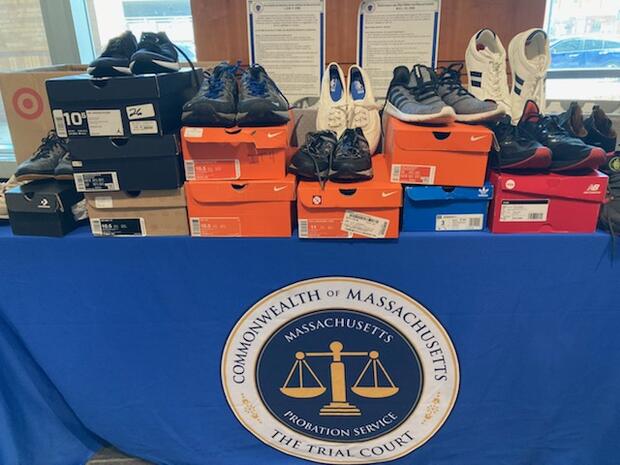- Massachusetts Probation Service
Media Contact
Coria Holland, Communications Director
The Pretrial Services Division of the Massachusetts Probation Service kicked off 2025 with a MassHealth and Mass Health Connector Enrollment Fair and sneaker give-away at Brockton District Court last Thursday.
The Pretrial Services team has held more than a dozen health insurance enrollment fairs throughout Massachusetts. Attendees are given the opportunity to enroll in MassHealth or Mass Health Connector, and change, renew or check their health insurance status.
"These dual-purpose events demonstrate the Massachusetts Probation Service's continued commitment to address both healthcare and basic needs, while fostering community support and well-being," said Jameson Dorrine, Pretrial Services Operations Coordinator.
In addition to enrolling individuals in MassHealth and Mass Health Connector, the Pretrial Services Unit collected over 100 pairs of shoes and organized a Sneakers and Slides Drive. Pretrial Services also provided Uber rides for court-involved individuals to travel to court and Community Justice Support sites across the state.
“The lack of health insurance is a major barrier for probationers, the court-involved, and those returning to the community after incarceration. The Probation Service works diligently to provide access to essential services for our clients such as health insurance, housing as well as educational and job training at our statewide 18 Community Justice Support Centers,” said Dr. Carmen Gomez, Deputy Commissioner of Pretrial Services.
Historically, uninsured rates among formerly incarcerated individuals are relatively high, according to national studies.
According to a study published in the American Journal of Preventive Medicine, 50 percent of state prisoners report being uninsured at the time of their arrest, and estimates conducted before the passage of the Affordable Care Act (ACA) suggest that uninsurance rates ranged from 40% to 90% among formerly incarcerated individuals. This data was cited in the study, “Previous Incarceration, Health Insurance, and the Affordable Care Act in the U.S."


